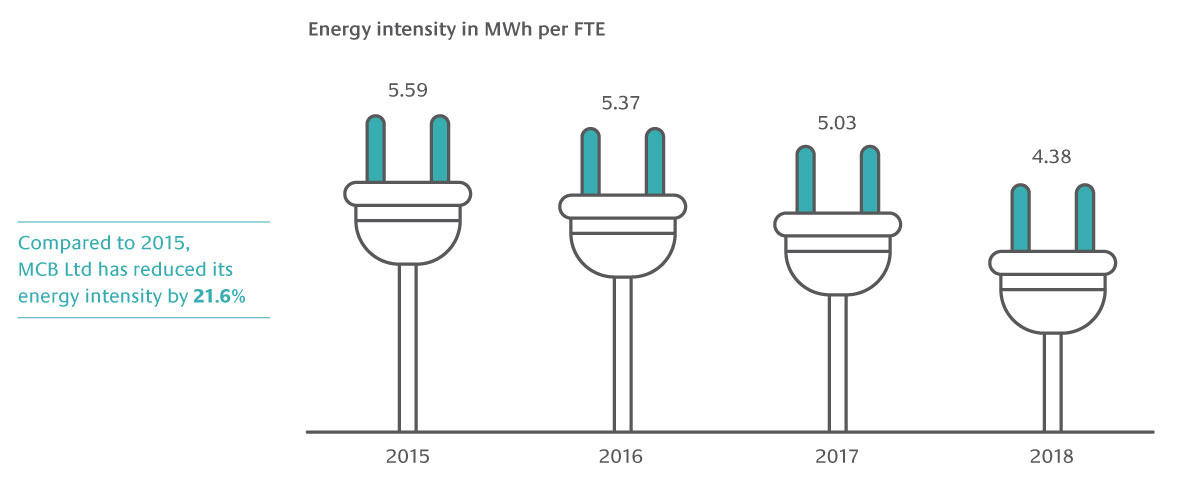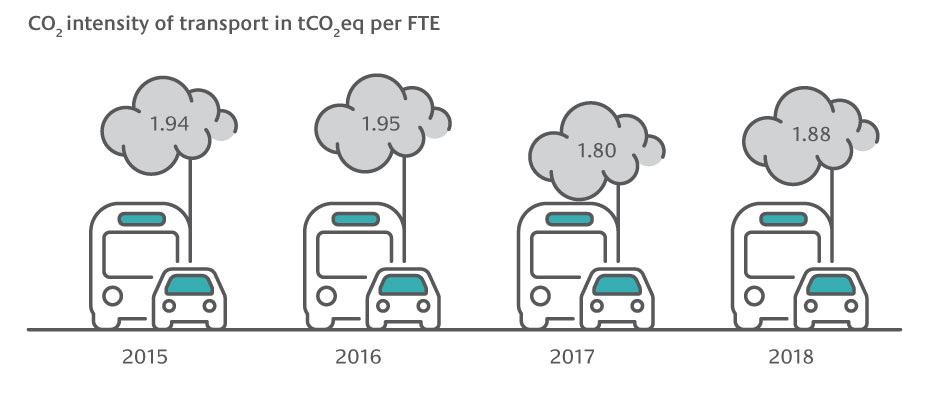
Investing in our environmental and cultural heritage
Direct environmental impacts of MCB Ltd6
Some environmental issues are critical in Mauritius and every local actor has a role to play to contribute to a cleaner footprint. A large proportion of waste is exported since the country lacks local recycling infrastructure. Local biodiversity is endangered, and both the air and the oceans suffer from pollution. Institutions like MCB Group have a double impact and contribution to the environment: direct impact through its operations and indirect impacts through its financing activities
6 KPIs reported in this section relate to our banking operations in Mauritius only and cover the reporting period January to December 2018.
Energy
MCB Ltd GOAL: -23% energy consumption by 2023 compared to 2018
Procurement of green electricity remains a challenge in Mauritius as the national electricity grid is heavily dependent on coal-fueled power plants.
MCB has thus built its own solar farm at its St-Jean building. The latter has provided 5.3% of the building’s global electricity consumption in 2018. This solar farm can provide a maximum of 20% of electricity required by the St-Jean building during clear sunny summer days.

Energy consumption from buildings constitutes MCB’s main carbon emission and as such, facilities management teams are continually working to improve energy efficiency in all MCB offices and premises in Mauritius, through renovation plans.
Equipment is also replaced or upgraded regularly to include energy-efficient technologies for computers, air-conditioners, motion sensors, lighting and printers. In 2016, the temperature of air-conditioning units was changed from 16 to 24°C in order to save energy, and all lights have been shifted to LED. In 2018, a significant reduction of 14.2% in energy consumption was observed, while energy intensity i.e. the energy consumed per full-time equivalent employee, has dropped by 12.8%.

Water
MCB Ltd GOAL: -25% energy consumption by 2023 compared to 2018
Although water usage is not significant for MCB, water monitoring and mitigation measures are in progress. The total water consumption of MCB Ltd was 39,521 m3 in 2018. Of note, this year’s data on water consumption is not comparable to prior years as the collection system has been greatly improved and is now more exhaustive.

Transport
With the Bank expanding internationally, business travel is unavoidable. MCB is therefore committed to making those business travels as energy-efficient as possible. With regards to employee commuting, MCB is equipped with charging stations to encourage employees to opt for greener cars.


Paper
MCB Ltd GOAL: under 100 tons of paper consumed by 2023
Paper consumption intensity has increased by 4.0% compared to last year though it has decreased by 12.7% when compared to 2015. In 2018, 57% of our paper waste was recycled via a professional recycler. The total volume of paper consumed in 2018 stood at 125.5 tons, an increase of 2.4% compared to the 2017 value.

The Group is also encouraging its customers and security holders to go paperless. Our banking customers are encouraged to subscribe to e-statements while the Group security holders are given the opportunity to subscribe to the electronic version of our annual report.

Waste
Mauritius does not have adequate recycling infrastructures. Most of the recyclable waste that is sorted out is exported for treatment. MCB ensures that the waste it produces is handled properly by carefully selected service providers.
The Bank encourages its staff to bring their own mugs at the office. Single-use plastics have practically been banned within our operations and we are investigating ways to eliminate them completely. Furthermore, all recyclable waste from the Head Office and the St-Jean building are collected by professional recyclers. Regarding organic waste at the Port-Louis and St-Jean restaurants, MCB is aiming at “zero waste” and has improved its meal reservation system accordingly. An organic composter is also in operation at the St-Jean office. With regards to e-waste, MCB has proactively sought sustainable disposal solutions for IT hardware reaching end-of-life phase. For the past two years, professional recyclers have collected MCB’s electronic waste as well as toners.
© 2019 MCB GROUP #Success Beyond Numbers

